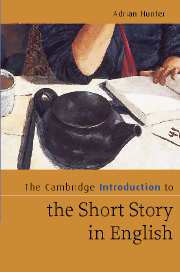Book contents
- Frontmatter
- Contents
- Acknowledgements
- Introduction
- Part I The nineteenth century
- Part II The modernist short story
- Part III Post-modernist stories
- Part IV Postcolonial and other stories
- Introduction: a ‘minor’ literature?
- Chapter 11 Frank Sargeson and Marjorie Barnard
- Chapter 12 James Kelman and Chinua Achebe
- Chapter 13 Alice Munro
- Notes
- Guide to further reading
- Index
- Titles in this series:
Chapter 11 - Frank Sargeson and Marjorie Barnard
Published online by Cambridge University Press: 05 June 2012
- Frontmatter
- Contents
- Acknowledgements
- Introduction
- Part I The nineteenth century
- Part II The modernist short story
- Part III Post-modernist stories
- Part IV Postcolonial and other stories
- Introduction: a ‘minor’ literature?
- Chapter 11 Frank Sargeson and Marjorie Barnard
- Chapter 12 James Kelman and Chinua Achebe
- Chapter 13 Alice Munro
- Notes
- Guide to further reading
- Index
- Titles in this series:
Summary
According to one recent critic, Frank Sargeson's work, ‘more than that of any other writer … signifies New Zealandness in our literature’. Certainly, his writing became, in the 1930s and 40s, synonymous with a particular sort of assertive, masculinist cultural nationalism. Yet Sargeson was also an astute reader of modern European and American writing, and wrote insightfully about Sherwood Anderson, Katherine Mansfield and D. H. Lawrence, to name but three. While he lived and worked during a period of considerable anxiety and agitation around questions of national political identity in New Zealand, and while he and his work were unquestioningly, and to a great degree justifiably, ‘claimed’ by the nationalist cause, Sargeson's writing is far more ambivalent and artful than such a political affiliation might suggest. They also, as in the case of his key story ‘The Making of a New Zealander’, resist the kind of political appropriations they were frequently subject to.
Frank Sargeson's short stories were published in three volumes: Conversation with My Uncle, and Other Sketches (1936), A Man and His Wife (1940) and That Summer, and Other Stories (1946). A qualified lawyer, he began publishing in the literary magazine Tomorrow in 1935, contributing wry, anecdotal sketches about the undistinguished lives of Depression-era labourers and unemployed itinerants, their unhappy marriages and dislocated families. Regionally specific and conventionally realist, the sketches were also distinctly ‘male’ in the subjects they treated, and ‘masculinist’ in the attitudes they expressed.
- Type
- Chapter
- Information
- The Cambridge Introduction to the Short Story in English , pp. 142 - 153Publisher: Cambridge University PressPrint publication year: 2007



